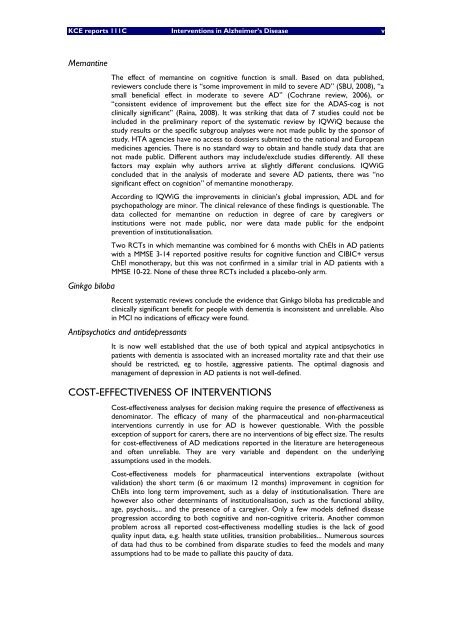Download the full report (112 p.) - KCE
Download the full report (112 p.) - KCE
Download the full report (112 p.) - KCE
Create successful ePaper yourself
Turn your PDF publications into a flip-book with our unique Google optimized e-Paper software.
<strong>KCE</strong> <strong>report</strong>s 111C Interventions in Alzheimer’s Disease v<br />
Memantine<br />
The effect of memantine on cognitive function is small. Based on data published,<br />
reviewers conclude <strong>the</strong>re is “some improvement in mild to severe AD” (SBU, 2008), “a<br />
small beneficial effect in moderate to severe AD” (Cochrane review, 2006), or<br />
“consistent evidence of improvement but <strong>the</strong> effect size for <strong>the</strong> ADAS-cog is not<br />
clinically significant” (Raina, 2008). It was striking that data of 7 studies could not be<br />
included in <strong>the</strong> preliminary <strong>report</strong> of <strong>the</strong> systematic review by IQWiQ because <strong>the</strong><br />
study results or <strong>the</strong> specific subgroup analyses were not made public by <strong>the</strong> sponsor of<br />
study. HTA agencies have no access to dossiers submitted to <strong>the</strong> national and European<br />
medicines agencies. There is no standard way to obtain and handle study data that are<br />
not made public. Different authors may include/exclude studies differently. All <strong>the</strong>se<br />
factors may explain why authors arrive at slightly different conclusions. IQWiG<br />
concluded that in <strong>the</strong> analysis of moderate and severe AD patients, <strong>the</strong>re was “no<br />
significant effect on cognition” of memantine mono<strong>the</strong>rapy.<br />
According to IQWiG <strong>the</strong> improvements in clinician’s global impression, ADL and for<br />
psychopathology are minor. The clinical relevance of <strong>the</strong>se findings is questionable. The<br />
data collected for memantine on reduction in degree of care by caregivers or<br />
institutions were not made public, nor were data made public for <strong>the</strong> endpoint<br />
prevention of institutionalisation.<br />
Two RCTs in which memantine was combined for 6 months with ChEIs in AD patients<br />
with a MMSE 3-14 <strong>report</strong>ed positive results for cognitive function and CIBIC+ versus<br />
ChEI mono<strong>the</strong>rapy, but this was not confirmed in a similar trial in AD patients with a<br />
MMSE 10-22. None of <strong>the</strong>se three RCTs included a placebo-only arm.<br />
Ginkgo biloba<br />
Recent systematic reviews conclude <strong>the</strong> evidence that Ginkgo biloba has predictable and<br />
clinically significant benefit for people with dementia is inconsistent and unreliable. Also<br />
in MCI no indications of efficacy were found.<br />
Antipsychotics and antidepressants<br />
It is now well established that <strong>the</strong> use of both typical and atypical antipsychotics in<br />
patients with dementia is associated with an increased mortality rate and that <strong>the</strong>ir use<br />
should be restricted, eg to hostile, aggressive patients. The optimal diagnosis and<br />
management of depression in AD patients is not well-defined.<br />
COST-EFFECTIVENESS OF INTERVENTIONS<br />
Cost-effectiveness analyses for decision making require <strong>the</strong> presence of effectiveness as<br />
denominator. The efficacy of many of <strong>the</strong> pharmaceutical and non-pharmaceutical<br />
interventions currently in use for AD is however questionable. With <strong>the</strong> possible<br />
exception of support for carers, <strong>the</strong>re are no interventions of big effect size. The results<br />
for cost-effectiveness of AD medications <strong>report</strong>ed in <strong>the</strong> literature are heterogeneous<br />
and often unreliable. They are very variable and dependent on <strong>the</strong> underlying<br />
assumptions used in <strong>the</strong> models.<br />
Cost-effectiveness models for pharmaceutical interventions extrapolate (without<br />
validation) <strong>the</strong> short term (6 or maximum 12 months) improvement in cognition for<br />
ChEIs into long term improvement, such as a delay of institutionalisation. There are<br />
however also o<strong>the</strong>r determinants of institutionalisation, such as <strong>the</strong> functional ability,<br />
age, psychosis,... and <strong>the</strong> presence of a caregiver. Only a few models defined disease<br />
progression according to both cognitive and non-cognitive criteria. Ano<strong>the</strong>r common<br />
problem across all <strong>report</strong>ed cost-effectiveness modelling studies is <strong>the</strong> lack of good<br />
quality input data, e.g. health state utilities, transition probabilities... Numerous sources<br />
of data had thus to be combined from disparate studies to feed <strong>the</strong> models and many<br />
assumptions had to be made to palliate this paucity of data.

















